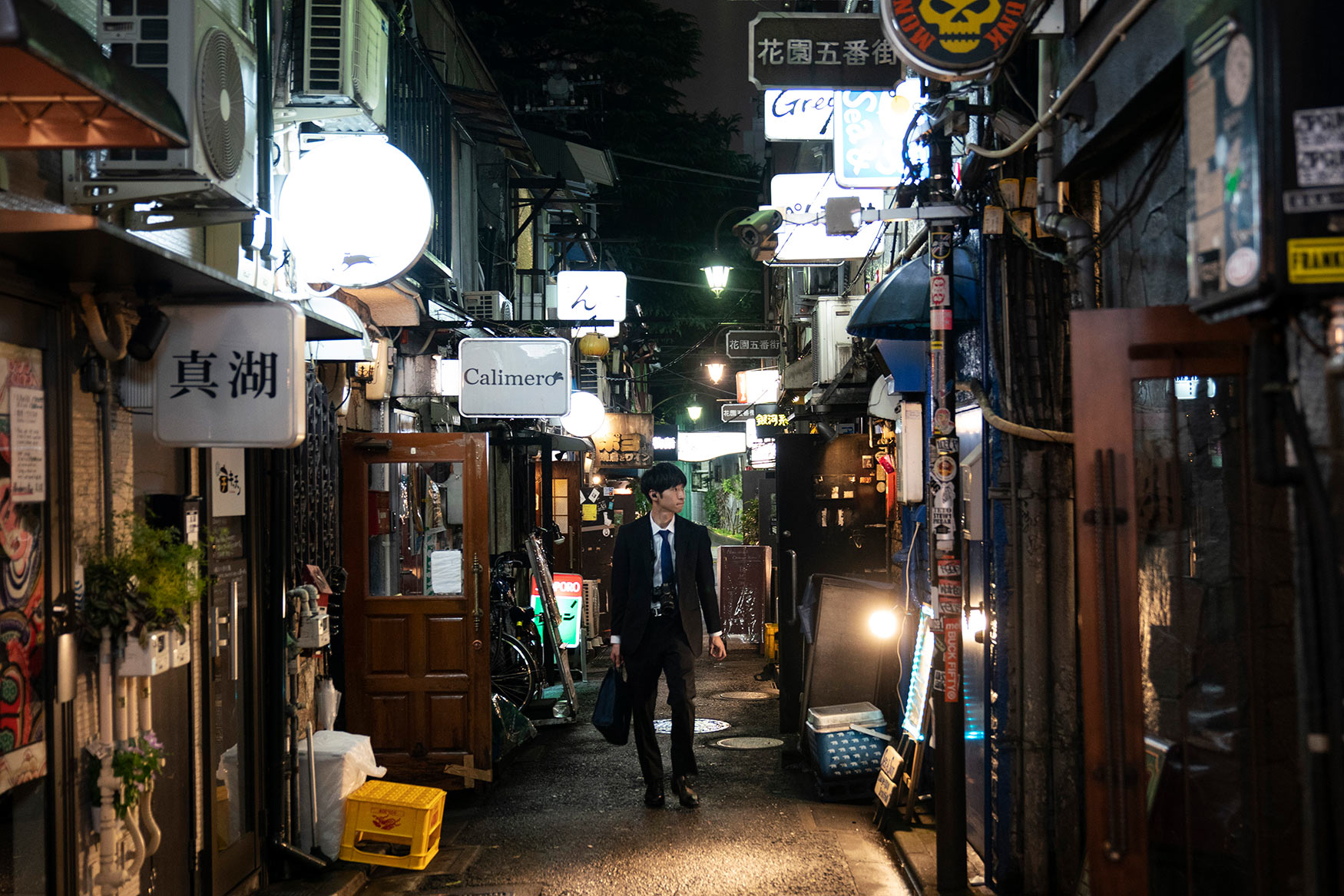Making most of small spaces in Tokyo's Golden Gai

It’s no secret Tokyoites are masters of making the most of space.
Take the Golden Gai in the Shinjuku district: Tucked between the Kabukicho entertainment district and Hanazono Shrine, nearly 280 bars and restaurants are squeezed into an area about the size of half a soccer field.
The Golden Gai is a sliver of old Tokyo in a modern metropolis filled with endless gleaming buildings. It’s a one-of-a-kind tourist attraction, for sure. But it’s also a place for a few drinks and friendly chatter among exhausted workers known as “salarymen.”
A man strolls through a narrow alleyway clustered with tiny bars and restaurants at the Golden Gai in the Shinjuku district of Tokyo, July 17, 2019. (AP Photo/Jae C. Hong)
Everything is smaller and narrower in this warren of shacks. Most bars seat seven or eight with little room to move. Some foreigners jokingly pose for photos that exaggerate their struggles with small doors and narrow staircases.
That didn’t stop 6-foot-7 Alaina Traxler, of Portland, Oregon, from enjoying his first visit. Traxler loved its coziness and intimacy.
“I was folded up in there. I’m literally taller than the room is,” Traxler said. “Absolutely worth squeezing in there.”
The Golden Gai didn’t start as a dense concentration of bars. It was a black market and a haven for prostitution until the early 1960s. Even though its reputation has improved, the Golden Gai has escaped Tokyo’s fast-forward development since then.
A man walks down the steps of a bar at the Golden Gai in the Shinjuku district of Tokyo, July 17, 2019. (AP Photo/Jae C. Hong)
A couple smokes cigarettes in a parking lot adjacent to the Golden Gai in the Shinjuku district of Tokyo, July 28, 2019. (AP Photo/Jae C. Hong)
People walk through alleyways clustered with tiny bars and restaurants at the Golden Gai in the Shinjuku district of Tokyo, July 28, 2019. (AP Photo/Jae C. Hong)
A tourist is silhouetted as she looks at the map of the Golden Gai in the Shinjuku district of Tokyo, July 28, 2019. (AP Photo/Jae C. Hong)
A group of patrons laugh as they listen to entertainer Tadashi Yokoda, far left, in a bar at the Golden Gai in the Shinjuku district of Tokyo, July 28, 2019. (AP Photo/Jae C. Hong)
A bartender fixes a drink in a bar decorated with thousands of messages written by patrons at the Golden Gai in the Shinjuku district of Tokyo, July 26, 2019. (AP Photo/Jae C. Hong)
A sign is posted on the wall clustered with bills from various countries in a bar at the Golden Gai in the Shinjuku district of Tokyo, July 17, 2019. (AP Photo/Jae C. Hong)
In this Sunday, July 28, 2019, photo, two musicians entertain patrons in a tiny bar at the Golden Gai in the Shinjuku district of Tokyo. (AP Photo/Jae C. Hong)
A bartender, in costume, prepares a drink for a patron in a bar at the Golden Gai in the Shinjuku district of Tokyo, July 26, 2019. (AP Photo/Jae C. Hong)
A sign is taped to the door of a bar at the Golden Gai in the Shinjuku district of Tokyo, July 17, 2019. (AP Photo/Jae C. Hong)
A man walks up a narrow staircase leading to a bar at the Golden Gai in the Shinjuku district of Tokyo, July 26, 2019. (AP Photo/Jae C. Hong)
A man makes his way through a narrow passageway between two buildings at the Golden Gai in the Shinjuku district of Tokyo, July 17, 2019. (AP Photo/Jae C. Hong)
Text from AP News story PHOTOS: Making most of small spaces in Tokyo’s Golden Gai, by Jae C. Hong.
Photos by Jae C. Hong







